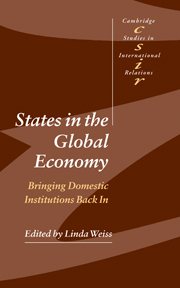Book contents
- Frontmatter
- Contents
- List of figures
- List of tables
- List of contributors
- Preface
- 1 Introduction: bringing domestic institutions back in
- Part I The resilience of welfare states
- Part II New economic challenges, changing state capacities
- Part III Governing globalisation
- 11 Managing openness in India: the social construction of a globalist narrative
- 12 Guiding globalisation in East Asia: new roles for old developmental states
- 13 Governing global finance: financial derivatives, liberal states, and transformative capacity
- 14 Is the state being ‘transformed’ by globalisation?
- List of references
- Index
- CAMBRIDGE STUDIES IN INTERNATIONAL RELATIONS
14 - Is the state being ‘transformed’ by globalisation?
Published online by Cambridge University Press: 22 September 2009
- Frontmatter
- Contents
- List of figures
- List of tables
- List of contributors
- Preface
- 1 Introduction: bringing domestic institutions back in
- Part I The resilience of welfare states
- Part II New economic challenges, changing state capacities
- Part III Governing globalisation
- 11 Managing openness in India: the social construction of a globalist narrative
- 12 Guiding globalisation in East Asia: new roles for old developmental states
- 13 Governing global finance: financial derivatives, liberal states, and transformative capacity
- 14 Is the state being ‘transformed’ by globalisation?
- List of references
- Index
- CAMBRIDGE STUDIES IN INTERNATIONAL RELATIONS
Summary
It is time to revisit the orienting questions of this volume and to consider how far our answers take forward the debate on globalisation and the state. What do the pressures of global capitalism imply for the state's ability to govern the domestic economy? How does increasing economic openness affect the institutional capacities and policies of the world's governing authorities? The chapters in this book have been concerned to draw out the implications of interdependence for the capacity of policymaking authorities at the centre of national structures of governance. Three objectives inform their analyses. The first has been to appraise the impact of globalisation, in its various manifestations, on the state's capacity to provide social protection and industrial governance. A further aim has been to specify the institutional conditions under which states are more or less able to mediate such impacts effectively. A final objective has been to elucidate how far, and in what ways, domestic political institutions, in performing that mediating role, are themselves being transformed.
Below we outline the three broad conclusions of the book on these issues, the questions raised for further research, and the way in which the perspective of this volume can help to advance the globalisation–state debate. Our three general conclusions concern: (1) the impact of globalisation on national governance; (2) the institutional conditions which blunt or sharpen the effects of interdependence; and (3) the impact of globalisation on institutional change. They structure the discussion that follows.
- Type
- Chapter
- Information
- States in the Global EconomyBringing Domestic Institutions Back In, pp. 293 - 317Publisher: Cambridge University PressPrint publication year: 2003
- 11
- Cited by

